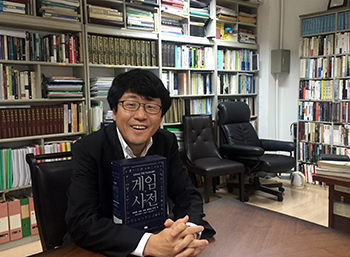
Among other things, Professor Lyou Chul-gyun is an amateur gamer. He even has his fair share of battle scars, having had his elbow ligament torn in a vain attempt to click 12 times in 1 second.
His journey as a gamer began in 2003, at age 38, with Linage II, a massive multiplayer online role-playing game. Originally, his motive was to understand the field of digital content and the advances in technology that gamers were consuming. However, his scholarly beginnings soon changed paths, as he found himself playing Linage II for 42 hours straight.
“In the case of the Digital Media graduate program, 90 percent of the available jobs in this field are in the game industry,” said Professor Lyou, explaining why he chose to venture into the world of gaming to study digital contents. “However, people still consider gaming culture to be in the low gutters. Nobody regards it as a serious topic of discussion, and consequently, the language associated with gaming is also looked down upon.”
Acknowledging the imbalance between soaring market trends and its bad reputation, Professor Lyou sought to curve the perception of gaming through his gaming dictionary.
The “Game Dictionary” was the center of attention, with the first publications having been sold out on the first day of release. This led to the immediate printing of the second round. Professor Lyou, who was not expecting the craze, gave his own interpretations about the high popularity.
“People working in the gaming industry have been unfairly judged and undervalued in society,” he said. “It might have been their deepened woes that made this book so successful in the beginning. In fact, many gaming companies were among our first consumers, having bought the dictionary for their offices.”
These people, according to Professor Lyou, are working in an extremely promising market, as the global game contents industry amounts to a staggering 11 trillion dollars. However, due to the continuous disparagement of the industry, the Korean gaming industry is at a stall, as the previous gaming powerhouse now ranks fourth, lagging behind China, America and Japan.
“The 11-trillion-dollar market of the gaming industry has much more significance in the Korean market, as opposed to any other market of a larger revenue,” said Professor Lyou.
This would be because in Professor Lyou’s point of view, the Korean market has the potential to dominate this massive gaming industry. Especially due to the fact that this market is largely shared online, this is a market that the Korean population can delve into, if they simply make the efforts.
However, one of the biggest barriers towards this dominance is the unfavorable perceptions towards gaming culture prevalent in the Korean society.
“If you think of how television was perceived in the earlier days, it was quite similar,” said Professor Lyou. “At first, television focused on moving images. So the content was mostly fast moving trains or sports like wrestling. It wasn’t very meaningful. However, as time passed, people started to utilize motion picture to tell stories. That was when the quality and perception of television and motion picture began to come out of the low land.”
Therefore, Professor Lyou is optimistic about the changing perceptions of the gaming industry, as he expects a similar senario to take place.
“Games started off with emphasis on the technological effects that you see in first person shooters or arcade games,” he said. “Now, we can see a lot of games with a storyline. Some of them are just plain heart-wrenching.”
As the gaming industry and culture are merging into the popular culture, it is important that we throw out our previous misconceptions of the gaming industry. In doing so, the industry is one that will open many possibilities for individuals and industries alike. An example of the vast opportunities the game industry can provide can be seen in the technological advances like virtual reality (VR) and augmented reality (AR). Both these technologies were introduced to general public through games.
“As a final statement, I would like to tell Ewha students that the gaming industry is really something to look into, especially for those seeking employment,” said Professor Lyou. “The game contents industry is far more complex, enriched, high-paying, and even one of the least gender biased industries out there.”
As Professor Lyou mentioned, considering the current advancements in game contents, Korea’s previous accomplishments in the field, the gaming industry may be one Ewha students should consider for the near future.

